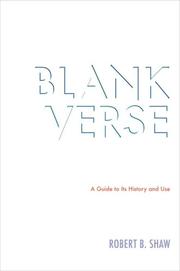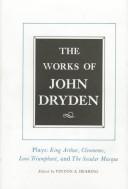| Listing 1 - 8 of 8 |
Sort by
|
Book
Year: 1907 Publisher: London,Glasgow : Gowans & Gray,
Abstract | Keywords | Export | Availability | Bookmark
 Loading...
Loading...Choose an application
- Reference Manager
- EndNote
- RefWorks (Direct export to RefWorks)
Blank verse --- English poetry --- Poésie anglaise --- English
Book
ISBN: 9781139517126 1139517120 9781139518987 1139518984 9781139178921 113917892X 9781107025400 1107025400 9781139515474 1139515470 9781107507838 1107232104 1139508377 1280774630 9786613685001 1139518054 1139514555 1107507839 Year: 2012 Publisher: Cambridge ; New York : Cambridge University Press,
Abstract | Keywords | Export | Availability | Bookmark
 Loading...
Loading...Choose an application
- Reference Manager
- EndNote
- RefWorks (Direct export to RefWorks)
Blank verse, unrhymed iambic pentameter, has been central to English poetry since the Renaissance. It is the basic vehicle of Shakespeare's plays and the form in which Milton chose to write Paradise Lost. Milton associated it with freedom, and the Romantics, connecting it in turn with freethinking, used it to explore change and confront modernity, sometimes in unexpectedly radical ways. Henry Weinfield's detailed readings of the masterpieces of English blank verse focus on Milton, Wordsworth, Shelley, Keats, Tennyson and Stevens. He traces the philosophical and psychological struggles underlying these poets' choice of form and genre, and the extent to which their work is marked, consciously or not, by the influence of other poets. Unusually attuned to echoes between poems, this study sheds new light on how important poetic texts, most of which are central to the literary canon, unfold as works of art.
Blank verse, English --- English literature --- English blank verse --- English poetry --- History and criticism. --- Arts and Humanities --- Literature

ISBN: 0821417576 082144235X 0821417584 9780821417577 9780821417584 Year: 2007 Publisher: Athens Ohio university press
Abstract | Keywords | Export | Availability | Bookmark
 Loading...
Loading...Choose an application
- Reference Manager
- EndNote
- RefWorks (Direct export to RefWorks)
Blank verse, English --- 820-1 --- English blank verse --- English poetry --- History and criticism --- Engelse literatuur: poëzie --- 820-1 Engelse literatuur: poëzie
Book
Year: 1931 Publisher: Menasha, Wis. : Printed for the author by George Banta publishingcompany,
Abstract | Keywords | Export | Availability | Bookmark
 Loading...
Loading...Choose an application
- Reference Manager
- EndNote
- RefWorks (Direct export to RefWorks)
English language --- Blank verse --- English drama --- Anglais (Langue) --- Théâtre anglais --- Versification --- History and criticism --- Histoire et critique
Book
ISBN: 1283213060 9786613213068 1571138145 1571134999 Year: 2011 Publisher: Rochester, N.Y. : Camden House,
Abstract | Keywords | Export | Availability | Bookmark
 Loading...
Loading...Choose an application
- Reference Manager
- EndNote
- RefWorks (Direct export to RefWorks)
North of Boston, Robert Frost's second book of verse and arguably his greatest, brought him suddenly into national prominence in 1915. Though completed and first published in England in 1914, the book was rooted in the decade, 1900-1910, that Frost spent in Derry, New Hampshire, where he witnessed the decline of its traditional farming culture. In presenting this "drama of disappearance," twelve of the book's fifteen principal poems are literally dramatic, composed mainly of direct dialogue. Among them are three of Frost's most famous lyrics, each featuring a signature task of New England life and underlining the book's tribute to a fading culture. Collectively, the poems bring the diction and tones of a New England vernacular within a traditional metric frame, making "music," as Frost boasted, "from the sound of sense" and poetry of "a language absolutely unliterary." Such adaptations of ordinary language and experience to blank verse drama made Frost a founder of American modernism and North of Boston one of its monuments. Exploring Frost's complex connection to his poetic characters, this study provides new readings of the individual poems and a new look at North of Boston's development. To a degree no other study has done, it addresses the book's design as an artistic whole while placing it in the context of Frost's unfolding career.
Authors, American --- History and criticism. --- Frost, Robert, --- Criticism and interpretation. --- American authors --- Frost, Robert Lee, --- פראסט, ראבערט, --- פרוסט, רוברט, --- فروست ، روبرت --- Фрост, Роберт, --- American modernism. --- New England. --- North of Boston. --- Robert Frost. --- blank verse drama. --- traditional farming culture. --- LITERARY CRITICISM / American / General.
Book
Year: 2024 Publisher: New York PH04
Abstract | Keywords | Export | Availability | Bookmark
 Loading...
Loading...Choose an application
- Reference Manager
- EndNote
- RefWorks (Direct export to RefWorks)
Poetry has been around for nearly five millennia, yet never has it been more puzzling. Technology, social media, and the blinding pace of contemporary life leave many students and readers in the dark. Just in time, this book comes to the rescue not just with a response to the problem of understanding and enjoying poetry, but it offers a solution. A widely published writer and poet, the author takes the mystery and madness out of verse with specific strategies designed to tame the poetic wilderness-not by dumbing down the poems but by raising the ability of readers to absorb this gem of literary form. Readers of all abilities and sensibilities will profit from the book's ability to drill down to the bedrock of meaning. Valenti mines his decades of experience writing, publishing, and teaching poetry to provide innovative hints, tips, guidelines, and directives that will benefit anyone wishing to cultivate their enjoyment of literature's highest form of expression.
Adverse --- Alison --- blank verse --- Dan Valenti --- Enjoy --- figurative language --- fireworks --- formal verse --- free verse --- hip hop --- How to Read and Enjoy Poetry --- imagery --- Jefferson --- linguistic --- metaphor --- meter --- personification --- poetic forms --- Poetry --- Read --- rhyme --- simile --- symbolism --- the amazing power of words --- utility for thought --- Valenti --- Verse --- Verse or Adverse

ISBN: 0191790001 1282382926 9786612382925 0520905199 9780520905191 0520018141 9780520018143 9780191790003 9781282382923 6612382929 Year: 1971 Publisher: Berkeley University of California Press
Abstract | Keywords | Export | Availability | Bookmark
 Loading...
Loading...Choose an application
- Reference Manager
- EndNote
- RefWorks (Direct export to RefWorks)
This collection of prose writing from the pen of Dryden dates from 1668 to 1691, and contains work that the editors describe as "a sampler of Dryden as biographer-historian, political commentator, religious controversialist, literary polemicist, literary theorist, and practical critic. Among the works contained here is his "Essay of Dramatick Poesie."
English poetry. --- LITERARY CRITICISM / European / English, Irish, Scottish, Welsh. --- English literature --- Dryden, John, --- Dryden, John --- Drāydan, Jawn, --- Dryden, --- Author of Absalom & Achitophel, --- Author of Absalom and Achitophel, --- Absalom & Achitophel, Author of, --- Drydon, John, --- Bays, --- Bayes, --- Person of quality, --- D-n, --- Driden, John, --- Drajden, Džon, --- Драјден, Џон, --- answer to rymer. --- blank verse. --- british literature. --- christianity. --- classics. --- duchess of york. --- empress of morocco. --- english monarchy. --- essay of dramatick poesie. --- fiction. --- his majesties declaration defended. --- literary criticism. --- literary theory. --- literature. --- nonfiction. --- plutarchs lives. --- poetry. --- politics. --- prose. --- religion. --- restoration comedy. --- restoration england. --- satire. --- wit.
Book
ISBN: 1282936433 9786612936432 1400836042 9781400836048 0691147248 9780691147246 9780691147246 0691178054 Year: 2010 Publisher: Princeton : Princeton University Press,
Abstract | Keywords | Export | Availability | Bookmark
 Loading...
Loading...Choose an application
- Reference Manager
- EndNote
- RefWorks (Direct export to RefWorks)
"Intro to Poetry Writing is always like this: a long labor, a breech birth, or, obversely, mining in the dark. You take healthy young Americans used to sunshine (aided sometimes by Xanax and Adderall), you blindfold them and lead them by the hand into a labyrinth made from bones. Then you tell them their assignment: 'Find the Grail. You have a New York minute to get it.'"--The Poetry Lesson The Poetry Lesson is a hilarious account of the first day of a creative writing course taught by a "typical fin-de-siècle salaried beatnik"--one with an antic imagination, an outsized personality and libido, and an endless store of entertaining literary anecdotes, reliable or otherwise. Neither a novel nor a memoir but mimicking aspects of each, The Poetry Lesson is pure Andrei Codrescu: irreverent, unconventional, brilliant, and always funny. Codrescu takes readers into the strange classroom and even stranger mind of a poet and English professor on the eve of retirement as he begins to teach his final semester of Intro to Poetry Writing. As he introduces his students to THE TOOLS OF POETRY (a list that includes a goatskin dream notebook, hypnosis, and cable TV) and THE TEN MUSES OF POETRY (mishearing, misunderstanding, mistranslating . . . ), and assigns each of them a tutelary "Ghost-Companion" poet, the teacher recalls wild tales from his coming of age as a poet in the 1960's and 1970's, even as he speculates about the lives and poetic and sexual potential of his twenty-first-century students. From arguing that Allen Ginsberg wasn't actually gay to telling about the time William Burroughs's funeral procession stopped at McDonald's, The Poetry Lesson is a thoroughly entertaining portrait of an inimitable poet, teacher, and storyteller.
Poets --- Authors --- A Coney Island of the Mind. --- Aldous Huxley. --- Allen Ginsberg. --- Amiri Baraka. --- An Embarrassment of Riches. --- Anna Akhmatova. --- Aphorism. --- Aram Saroyan. --- Arthur Rimbaud. --- Aubade. --- Barney Rosset. --- Beat Generation. --- Bei Dao. --- Bertolt Brecht. --- Black Man. --- Blank verse. --- Boredom. --- Britney Spears. --- Cataclysm (Dragonlance). --- Charles Bukowski. --- Che Guevara. --- Cunt. --- De Profundis (letter). --- Death in Venice. --- Deathbed. --- Edgar Allan Poe. --- Emily Dickinson. --- English muffin. --- Ezra Pound. --- Feral cat. --- Flapper. --- French Colonial. --- French Communist Party. --- From Beyond the Grave. --- Futility (poem). --- Gabriela Mistral. --- Gaggle. --- Gertrude Stein. --- Gregory Corso. --- Guerrilla warfare. --- Guillaume Apollinaire. --- Heir to the Empire. --- Hippie. --- His Family. --- I Wish (manhwa). --- In Another Country. --- Isadora Duncan. --- Jack Kerouac. --- Jacques Maritain. --- James Merrill. --- Jan Hus. --- Jan Kerouac. --- Jim Morrison. --- Joan Vollmer. --- Junkie (novel). --- Kitsch. --- Lawrence Ferlinghetti. --- Libido. --- Lord Byron. --- Marilyn Monroe. --- Max Jacob. --- McSorley's Old Ale House. --- Memoir. --- Mennonite. --- Mexico City Blues. --- Milan Kundera. --- Miroslav Holub. --- Monomania. --- Mr. --- Naked Lunch. --- Nobel Prize. --- Olga Rudge. --- Orgy. --- Patti Smith. --- Pheromone. --- Pocket watch. --- Poet laureate. --- Poetry. --- Pretty Face. --- Pyramid scheme. --- Racism. --- Rant (novel). --- Red Mass. --- Ridicule. --- Shel Silverstein. --- Sodomy. --- Surrealism. --- Take Shelter. --- The New York Times Book Review. --- The Other Hand. --- The Price of Gold. --- The Scary Guy. --- This Country. --- To This Day. --- Tristan Tzara. --- Under the Volcano. --- Wallace Stevens. --- War and War. --- William Saroyan. --- Young Widow.
| Listing 1 - 8 of 8 |
Sort by
|

 Search
Search Feedback
Feedback About UniCat
About UniCat  Help
Help News
News